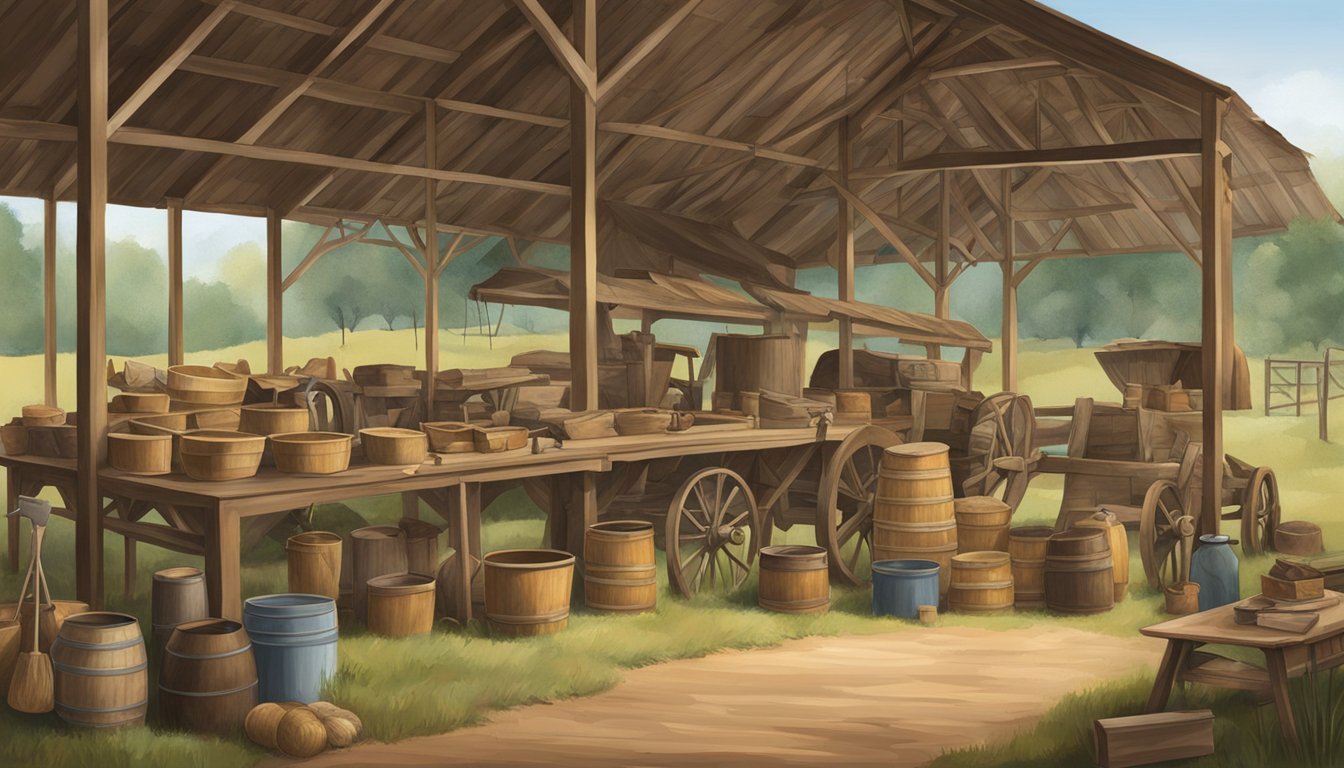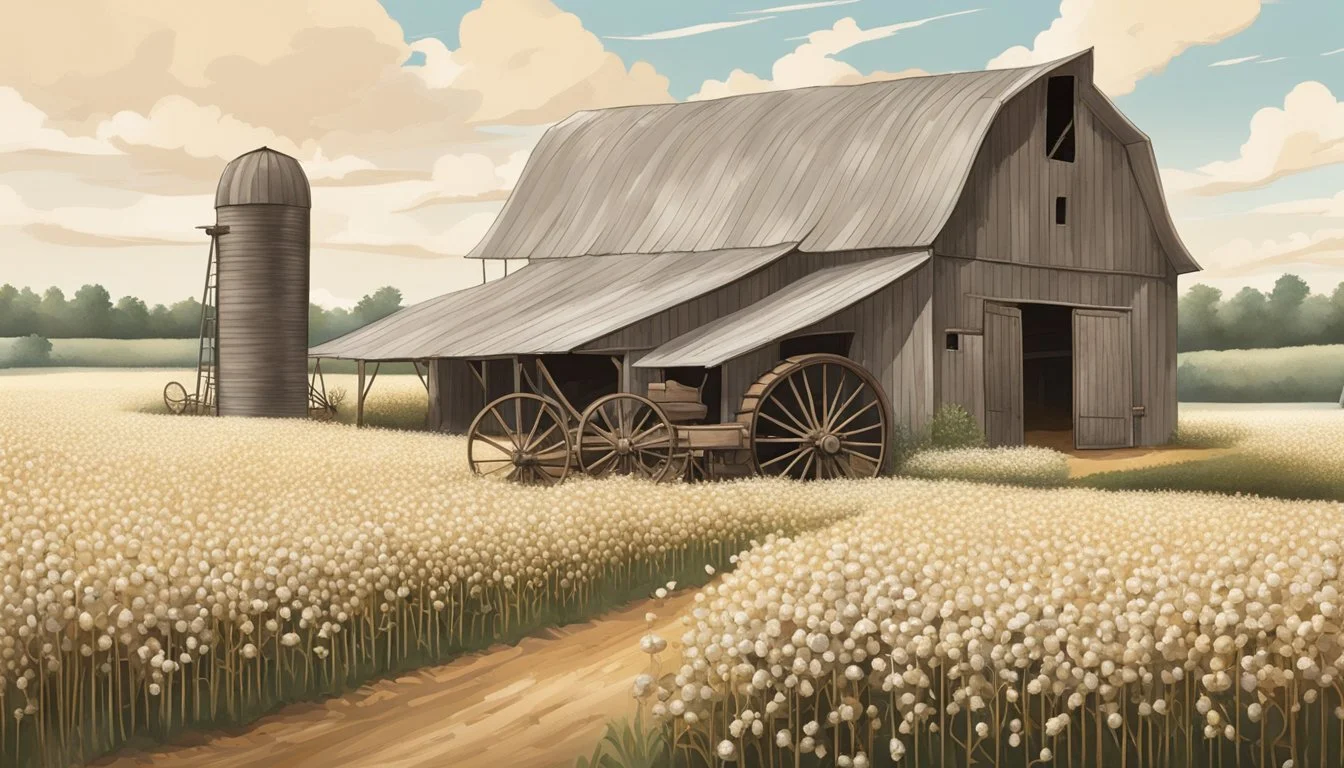Historical Farms and Agricultural Museums in Mississippi
Exploring Rural Heritage
Mississippi's rich soil and warm climate have long made it a hub for agricultural development, shaping both the landscape and cultural heritage of the state. Historical farms and agricultural museums dotted across Mississippi offer visitors a unique window into the past, presenting a vivid tableau of the state's agrarian history. These institutions serve as custodians of the evolution of farming practices, showcasing everything from Choctaw contributions to agriculture, to the state's role in modern farming innovations like catfish aquaculture.
The Mississippi Agriculture & Forestry Museum stands as a testament to this storied past, fostering an understanding of how agriculture and forestry shaped the state's economic and social fabric. Visitors can explore a variety of exhibits, ranging from an authentic crossroads town to a living history farm that simulates agricultural life as it was in yesteryears. The museum encapsulates 500 years of agricultural practices, revealing how they have evolved and continue to influence life in Mississippi.
Embracing both the trials and triumphs of the state's agricultural saga, these sites offer educational experiences that connect people with the land and its history. The connection extends beyond the museum walls as historic farmsteads and exhibits honor the enduring legacy of Mississippi's agricultural community, while also pointing to the future of farming in the state. Through immersive storytelling and interactive displays, Mississippi's agricultural museums not only preserve the past but also inspire a deeper appreciation for the ongoing story of human cultivation and rural life.
Historical Context of Agriculture in Mississippi
Mississippi's agricultural sector historically played a pivotal role in shaping the social and economic fabric of the state. This rich history is encapsulated within its evolving farm practices and the prominence of its cotton and forestry industries.
Evolution of Farming Practices
The way agriculture has been practiced in Mississippi has seen profound transformations over the years. Initially, the region's farms utilized manual labor and rudimentary tools, a situation that persisted until technological advancements introduced mechanized equipment. As the Mississippi Encyclopedia illustrates, from ploughshares to tractors, each innovation marked a new era, increasing efficiency and productivity on Mississippi's farms. These advancements also led to changes in the social fabric of rural communities, as fewer laborers were needed on farms.
Significance of Cotton and Forestry Industries
Mississippi's history cannot be recounted without acknowledging the significance of the cotton and forestry industries. Cotton, known as white gold, became the backbone of the state's economy, with Mississippi sitting at the heart of the American Cotton Belt. As documented through various historical exhibits, the rise of King Cotton established Mississippi as a key player in the United States' agricultural history. Concurrently, Mississippi's rich woodlands fostered a robust forestry industry, contributing significantly to both state and national markets. This dual reliance on agriculture and forestry industries would shape Mississippi's economic landscape far into the future.
Notable Historical Farms and Agricultural Museums
Mississippi boasts diverse institutions that preserve its rich agricultural heritage, showcasing historical farms and featuring a myriad of agricultural artifacts. These sites offer immersive experiences, allowing visitors to step back in time and explore the state's farming legacy through exhibits and living history demonstrations.
Mississippi Agriculture and Forestry Museum
The Mississippi Agriculture and Forestry Museum in Jackson serves as a cultural touchstone, highlighting the state's agricultural progress and forestry industry. The museum hosts a wide array of artifacts and interactive exhibits that chronicle the evolution of agriculture and its impact on Mississippi's economy and culture.
Fortenberry-Parkman Farmstead
Nestled within the museum grounds, the Fortenberry-Parkman Farmstead stands as a testament to rural Mississippi life in the early 20th century. The farmstead provides a tangible connection to the past, with its faithfully restored structures and equipment that detail the daily lives of Mississippi's farmers of yesteryear.
Living History Farm at the Lefleur Museum District
Adjacent to the Mississippi Agriculture and Forestry Museum, the Living History Farm at the Lefleur Museum District invites visitors to experience historical farm life in action. This farm offers a dynamic view of history through live demonstrations, allowing individuals to observe and participate in traditional farming techniques.
Agricultural Museums and Cultural Significance
Agricultural museums in Mississippi showcase the state's rich agricultural heritage through collections and exhibitions, while also offering cultural programs and educational outreach.
Collections and Exhibitions
Agricultural museums, such as the Mississippi Agriculture & Forestry Museum, boast a variety of exhibits that chronicle the evolution of farming practices in the region. These institutions often house artifacts that span from pre-industrial tools to modern-day implements, offering visitors a tangible look at the technological advancements in agriculture. Collections may include antique tractors, farming equipment, household items, and recreations of historical settings such as a Heritage Center or a General Store.
In addition to these artifacts, some museums provide interactive exhibits, like the Children's Barn, where visitors can engage directly with farm life. Through these exhibits, museums aim to preserve and present the agricultural narrative of Mississippi, illustrating the important role that farming has played in the state's development.
Cultural Programs and Educational Outreach
Through educational programs and cultural events, agricultural museums play a pivotal role in fostering community engagement and appreciation for Mississippi's farming legacy. For example, the Catfish Row Museum not only explores farming's past but also addresses the contemporary cultural significance of agriculture and its impact on society.
Museums often host workshops, lectures, and interactive programs that cater to a diverse audience, including school groups, families, and farming professionals. These events may feature topics like crop cultivation, sustainable farming practices, and the cultural implications of agricultural production. Heritage events such as historical reenactments at a Church or craft demonstrations at an Art exhibit are instrumental in connecting the community with their cultural roots, making these museums vital resources for education and cultural preservation.
Living History and Interactions
Mississippi's agricultural museums offer visitors the unique opportunity to step back in time and experience farm life as it was in the past. Living History is at the forefront of these interactions, providing tangible connections to our agricultural heritage.
Reenactments and Demonstrations
At sites like Mississippi's Agricultural History Museum, actors in period costume bring historical farmsteads to life, demonstrating traditional farming techniques. These skilled interpreters employ a range of authentic farm equipment in their work, plowing fields or harvesting crops, just as their predecessors did. The National Agricultural Aviation Museum, part of the museum campus, further enriches the narrative, allowing visitors to explore the contributions of aviation to agriculture.
Hands-On Experience with Farm Life
Interaction isn't simply observation — visitors are invited to immerse themselves in activities. They can handle animals, participate in planting or tending to gardens, and even experience the operation of period farm equipment under supervision. This hands-on approach not only educates but fosters a deeper appreciation for the advancements in agriculture and the efforts of those who have lived and worked on farms through the centuries.
Preservation and Continuous Learning
Preservation of Mississippi's agricultural history is a testament to the state's commitment to maintain its heritage and share the story of its development through farms and agriculture. Continuous learning provides a rich, educational backdrop that speaks to residents and visitors alike, ensuring the knowledge and lessons of the past are not forgotten.
Archiving Agricultural History
Mississippi’s agricultural heritage is carefully chronicled through various collections that include memorabilia, documents, and photographs detailing centuries of farming history. The MS Ag Museum stands out in its efforts to archive the state's agricultural history, showcasing everything from the early contributions of the Choctaw population to modern conservation efforts and catfish farming.
Partnerships with Organizations and Institutions
Strong partnerships are key in preserving historical narratives and promoting education. The Association for Living History, Farm and Agricultural Museums (ALHFAM) collaborates with institutions like the Smithsonian to uphold folklife and agricultural legacies. These organizations work together to safeguard the tangible evidence of agricultural progress and ensure that the lessons of heritage farms are accessible for future generations.
Visiting and Experiencing Agricultural History
Mississippi's rich agricultural past is encapsulated within its historical farms and museums, offering a variety of tours and hands-on experiences. Visitors can engage with exhibits that reveal 500 years of farming practices, from the influence of the Choctaw people to the modern advancements in agriculture.
Guided Tours and Self-Exploration
Visitors to the Mississippi Agriculture and Forestry Museum have the opportunity to experience agriculture's evolution firsthand. Guided tours provide in-depth insights into the collection of artifacts and exhibits on Main Street, Mississippi, complete with a recreated country store and the historic Fortenberry-Parkman Farm. For independent explorers, self-guided tours offer the flexibility to discover the museum's grounds at their own pace, encountering the heritage of Jackson, MS through detailed exhibits and displays.
Events and Seasonal Activities
The museum isn't just a showcase of static displays; it's a venue for vibrant, seasonal events that breathe life into Mississippi’s agricultural history. Throughout the year, visitors can participate in events such as harvest festivals and living history demonstrations, listed on TripAdvisor with glowing reviews. Each event provides a chance to witness traditions and techniques that shaped the region’s past. Additionally, the museum offers educational programs tailored towards both children and adults. These events underscore the significance of agriculture to Mississippi's cultural identity.
After the tours and events, guests can visit the gift shop, where they can purchase unique memorabilia and regionally crafted goods, completing the authentic experience of Mississippi's agrarian heritage.








